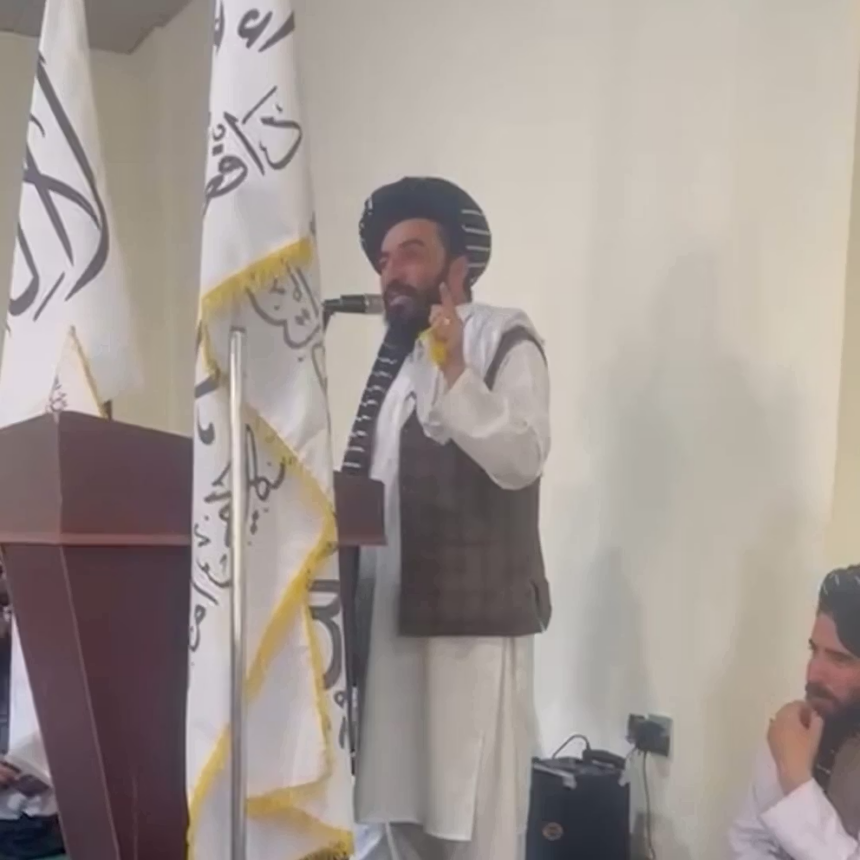RASC News Agency: A recently circulated video on Afghanistan’s social media has once again laid bare the Taliban’s entrenched hostility toward independent journalism and the free flow of information. In the footage, Mawlawi Mohammad Omar Mokhles, the former Taliban police chief in Paktia province and a close associate of the Haqqani network, brazenly admits that his forces intended to kill journalists and media workers. Speaking at a farewell gathering marking his removal from Paktia command, Mokhles declared: “Journalists were not journalists they were traitors. We would have killed them all and hunted them down, but they fled and reached their foreign masters.”
Local sources confirm that the video was filmed during Mokhles’s formal departure from the provincial command. For years, he ran Paktia as a personal fiefdom, exercising power with near-total impunity. His remarks reveal, without disguise, the Taliban’s systematic war against freedom of expression and their relentless branding of independent voices as enemies of the state.
Behind the scenes, his removal reportedly triggered fierce tensions among the Taliban leadership. Supreme Leader Hibatullah Akhundzada demanded his dismissal, citing repeated insubordination. Yet Interior Minister Sirajuddin Haqqani resisted, making clandestine trips to Paktia to shield his loyal commander. In the end, a compromise was reached: Mokhles was not punished, but transferred to Kabul and even elevated to command the so-called “Third Security Zone” of the capital. The episode illustrates a regime that protects its enforcers rather than holding them accountable a system where loyalty and brutality are rewarded.
Mokhles’s admission is not a slip of the tongue, but rather a glimpse into a broader pattern of repression. Since seizing power in August 2021, the Taliban have waged an unrelenting assault on the press. Journalists across Afghanistan face constant threats, arbitrary detention, beatings, and torture. Entire media outlets have been forced into silence, either shuttered by decree or suffocated by censorship. Reporting on women’s rights, corruption, or any criticism of the regime has effectively become forbidden.
According to data from the Afghanistan’s media watchdog NAI, at least 165 journalists and media workers have been killed in Afghanistan over the past two decades. Since the Taliban’s return, dozens of radio, print, and television outlets have vanished, while those that remain function under suffocating restrictions. The Ministry of Justice has imposed directives that have transformed once-vibrant newsrooms into hollow mouthpieces of Taliban propaganda.
International watchdogs consistently warn that Afghanistan today ranks among the world’s most dangerous environments for journalists. Hundreds of reporters have fled abroad, many trapped in precarious exile in Iran, Pakistan, and elsewhere awaiting asylum decisions, living under the constant threat of deportation, and stripped of the profession to which they once dedicated their lives.
The revelations from Mokhles’s farewell speech are a stark confirmation of what Afghanistanis and the international community already know: the Taliban’s hostility to journalism is deliberate, systematic, and inseparable from their model of governance. By silencing critical voices and persecuting those who seek to expose the truth, the regime has turned Afghanistan into a nation without independent media a country where fear replaces fact, silence replaces speech, and repression replaces freedom.






